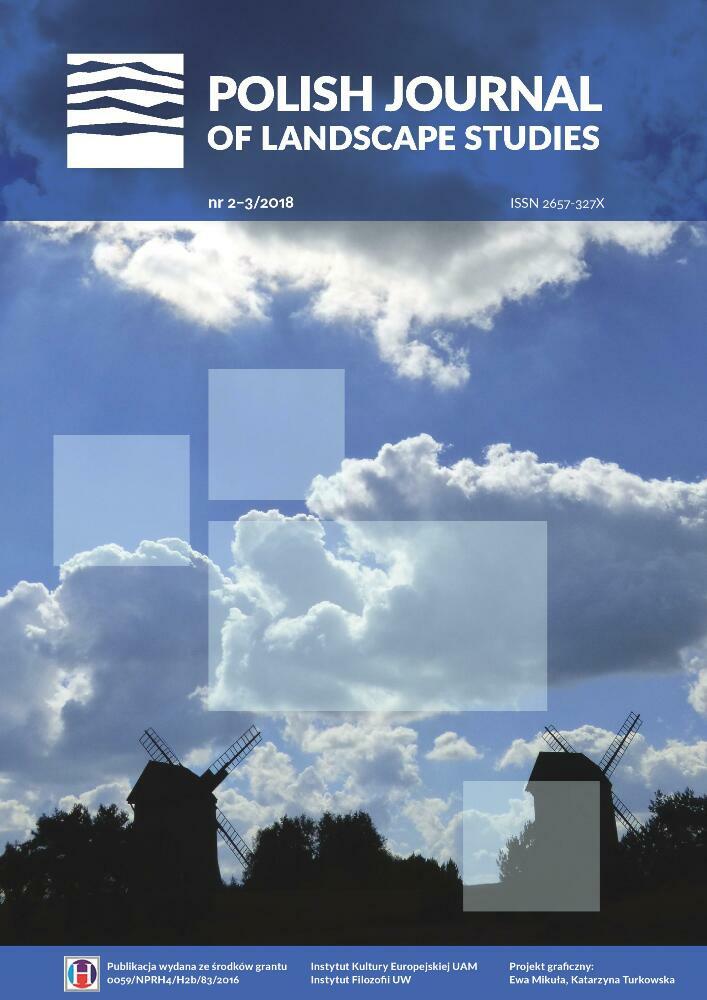Abstrakt
The analysis sets out from the exhibition entitled Ressource Kunst. Die Elemente Neu Gesehen. The author attempts to outline an area which emerges from the encounter of ecology (as a domain of reflection about the human surroundings) and aesthetics (as a discipline concerned with sensory experience) from the standpoint of post-modernism. The inquiry thus focuses on the moment in which contemporary artistic practices “internalize” ecological issues. Aesthetics becomes a branch of ecology, but at the same time ecology becomes a domain within aesthetics. According to the author, post-modernism has offered advantageous perspectives for pursuing ecological postulations.Bibliografia
Adorno, Theodor W. 1991. Notes to Literature, vol. 2. Translated by Rolph Tiedemann. New York: Columbia University Press.
Czajka, Anna. 1991. Człowiek znaczy nadzieja. O filozofii Ernesta Blocha [Human Stands for Hope: On Ernest Bloch’s Philosophy]. Warsaw: FEA.
Heidegger, Martin. 1971. “Building, Dwelling, Thinking.” In Martin Heidegger, Poetry, Language, Thought. Translated by Alfred Hofstadter, 143—62. New York: Harper & Row.
Heidegger, Martin. 2001. “What Are Poets For?” In Martin Heidegger, Poetry, Language, Thought. Translated by Alfred Hofstadter, 87—139. New York: Harper & Row.
Heidegger, Martin. 2002. “The Origin of the Work of Art.” In Martin Heidegger, Off the Beaten Track. Edited and translated by Julian Young and Kenneth Heynes, 1—56. Cambridge: Cambridge University Press.
Jappe, Georg. 1989. Ressource Kunst. Die EIemente neu gesehen. Köln: DuMont Buchverlag.
Jameson, Frederic. 1991. Postmodernism, or, the Cultural Logic of Late Capitalism. London: Verso.
Lyotard, Jean-François. 1984. The Postmodern Condition: A Report on Knowledge. Translated by Geoff Benington. Manchester: Manchester University Press.
Morawski, Stefan. 1992. Główne nurty estetyki XX wieku [Main Trends in 20th Century Aesthetics]. Wrocław: Wiedza o kulturze.
Newman, Charles. 1985. Postmodern Aura: The Act of Fiction in an Age of Inflation. Evanston: Northwestern University Press.
Rilke, Rainer Maria. 1948. Letter of Rainer Maria Rilke. Volume 2 1910—1926. Translated by Jane Bannard Green and M.D. Herter Norton. New York: Norton.
Vattimo, Gianni. 1991. The End of Modernity: Nihilism and Hermeneutics in Postmodern Culture. Translated by Jon R. Snyder. Baltimore: John Hopkins University.
Welsch, Wolfgang. 1992. “Ku jakiemu podmiotowi—dla jakiego innego?” [“To What Subject—For Whom Else?”]. In Schelling o pojęciu subiektywności [Schelling on the Idea of Subjectivity], edited by Mirosława Czarnawska. Białystok: ldea.
Welsch, Wolfgang. 1991. Ästhetisches Denken. Stuttgart: Reclam.
Welsch, Wolfgang. 1987. Unsere postmoderne Moderne. Weinheim: VCH.
Wilkoszewska, Krystyna. 1990. “Estetyka ekologiczna” [“Ecological aesthetics”]. In Nauka o pięknie. Rozprawy z pogranicza estetyki, aksjologii ogólnej antropologii filozoficznej [The Science of Beauty: Papers on the Crossroads of Aesthetics, General Axiology, and Philosophical Anthropology], edited by Maria Gołaszewska. Kraków: Wydawnictwo UMCS.
Wilkoszewska, Krystyna. 1992. Sztuka jako rytm życia. Rekonstrukcja filozofii sztuki Johna Deweya [Art as the Rhythm of Life: A Reconstruction of John Dewey’s Philosophy of Art]. Kraków: Wydawnictwo UJ.
Zeidler-Janiszewska, Anna. 1988. Sztuka, mit, hermeneutyka [Art, Myth, Hermeneutics]. Warsaw: Wydawnictwo Naukowe Instytutu Kultury MkiSz.
